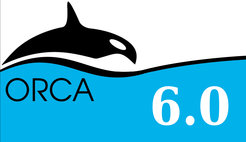A computer program takes a quantum leap
ORCA 6.0 is a significant improvement in comparison to previous versions
Faster, clearer and more functionalities: We explain what the new ORCA 6.0 program can do - and for whom the software is useful.

Our ORCA Team has recently presented the latest version of the quantum chemistry program. In this article, we summarize the most important key points of the release.
Who is actually interested in ORCA?
Quantum chemical calculations have become an integral part of modern chemistry, even for experimental chemists. One of the world's best-known programs that support researchers in this work is ORCA, which was created more than 20 years ago by Prof. Frank Neese and is now being further developed by a team of around 30 developers and international cooperation partners. The users of ORCA have always been mainly academics: the aforementioned chemists and biochemists, for example. However, more and more computer companies are also interested. “This has to do with the fact that quantum chemistry is very demanding computing,” explains Neese, Director at the MPI für Kohlenforschung. Many large companies use programs such as ORCA to carry out stress tests for their systems, he explains. “If you want to make large computers sweat, quantum chemistry programs are just the thing for you.” While users with a purely academic interest in the product can download and use ORCA free of charge, licenses for commercial customers are distributed by the company FACCTS.
What is so special about ORCA 6.0?
ORCA 5.0, launched in 2021, has already seen a veritable explosion in user numbers. “There are now around 100,000 users, which is around three times as many as three years ago,” reveals Frank Neese. In his opinion, the lively interest in the program is due not only to ORCA's very large and in some cases unique range of functions, but also to its very high efficiency. In particular, the transition to ORCA 5 saw the implementation of the so-called SHARK module, an integral package that has significantly improved the calculation of reactions and molecular structures for users. With ORCA 6.0, this calculation process has been simplified further, making calculations even faster for users than before. “As a scientist, I get my results even faster, and that is a very important aspect in today's research.” There are also some new features, such as calculating the optimal interaction geometry of two colliding molecules - a key scenario in chemistry. In addition, it is now easy to calculate how the molecules behave in a solvent and what spectroscopic properties it has.
So is it all about speed?
Clearly, no. “The really special thing about ORCA 6.0 is what has happened below the surface,” says Frank Neese. ORCA is based on code that originated more than 20 years ago. Since then, a lot has been worked on, added and changed: Orca grew. “But the old program wasn't all of a piece,” admits Neese, “there was no coherent concept, it was confusing and it was getting complicated to work on.” Therefore, Neese and his team have spent the past few years rebuilding ORCA - from scratch. ORCA 6.0 is now, says Neese, extremely lean, clear and can still grow organically.
Why was this change necessary?
Computers, tablets, smartphones: hardware has developed rapidly in recent years, says Frank Neese. And ORCA, whose core was more than 20 years old, was in danger of becoming obsolete and therefore no longer usable. “That would have killed the program,” says Neese. So he and his team have spent a lot of time and energy over the past three years writing the new version. The core team, says Neese, comprised around 30 people. “And none of them,” he emphasizes, “are professionals in coding or developing software. We are chemists and physicists." Nevertheless, it worked. And with this version, he is certain that ORCA can continue to run for the next 20 to 30 years without any problems. “As far as I know, there has never been such a reorganization of a large quantum chemistry package in the history of our discipline,” explains Neese.
Does this mean that the scientific community can now sit back and relax thanks to ORCA 6.0?
“Absolutely not,” says Neese, adding that ORCA is limited in time even after the update. In addition, the program can calculate a lot, but by no means everything. There is also currently no graphical interface for users. On the one hand, scientists will always need programs like ORCA - whether they are theoreticians or experimental chemists. On the other hand, junior staff hardly have time to develop such programs from scratch. “Writing a code doesn't earn me the same scientific reputation as my own research work,” says Neese. Nevertheless, it is essential that it is scientists, not just computer scientists, who develop these programs. A publicly funded institute dedicated to the development of generally accessible software could be a possible solution.
Details on the new ORCA can be found in the newly published manual, which comprises around 1,500 pages. It will also soon be possible to watch the recording of the release stream.












